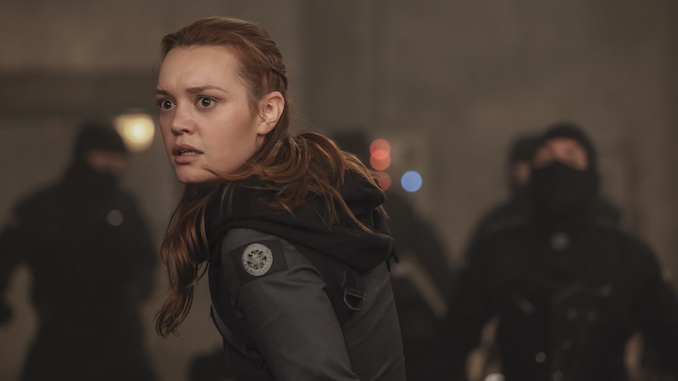Motherland: Fort Salem‘s Messy Series Finale Proved Why It’s Always Needed More Time
Photo Courtesy of Freeform

Motherland: Fort Salem is, without a doubt, one of the most original shows I’ve seen in recent years. Coming completely from the mind of executive producer and creator Elliot Lawrence, it’s one of the few series not based on a comic, book, or previous show or film; it’s completely new and refreshing. Unfortunately, though, its sprawling world and untouched lore made condensing it all into only three seasons a difficult feat. The series finale, which wraps just 30 total episodes across all seasons, is messy and fast-paced, proving this rich, original world always just needed more time.
While filming the third season of the show, lead Taylor Hickson’s production vehicle was hit by another car. Her injury was bad enough to leave her missing from six episodes, unfortunately also leaving her character Raelle noticeably absent from the show’s final season. Motherland did what it could to work around her absence (as any good employer should), giving Hickson the proper time to rest; unfortunately, the TV industry pauses for no one, and the show had to go on. This left the middle of its 10-episode season in limbo, waiting for Raelle to return before the plot could actually progress in a meaningful way. Which, ultimately, left the back half of the season lead-footing the gas, trying to zoom through what should have been a season’s worth of story in just three episodes. (Just to make this extra clear: this is not the fault of Hickson or the team behind Motherland: Fort Salem, it simply is an explainer for some of the questionable pacing and story decisions.)
This is not to say that the final season was bad—it wasn’t, and its fumbled finale is not the sum of its parts, leaving fans with a plethora of character moments and storylines to hold onto as the series comes to a close. Strangled by a short, 10-episode order and nipped at the bud just three seasons in, Motherland: Fort Salem managed to do a lot with very little, but I can’t help but wish it had gotten so much more.
In Episode 9, Motherland speed-ran an arrest, a trial, a double wedding, and an attack on Fort Salem. The finale picks up in the immediate aftermath, kicking off “Revolution Part 2” to match Season 2’s “Revolution Part 1.” In the same way that Episode 9 blew through an almost unreasonable amount of plot points, Episode 10 fell victim to the same problem. There were so many things that happened in this episode that it truly could have covered three episodes instead of an overstuffed series finale. Anacostia’s death is the most heinous example of the plot completely cruising right past what could—and should—have been the most crushing blow in this finale. She was a pillar of the show, one of the most interesting and beloved characters, and her death was blink-and-you’ll-miss-it. With how quickly her death came and went, it almost felt like they killed her to up the show’s body count, rather than to actually end her story in a meaningful way. Though it might have been a way to illustrate the quickness and deadliness of war, even her brief memorial—if you could call it that—felt like a disservice to her character.
Speaking of quick deaths, the deaths of both Hearst and Silver left much to be desired. For a villain that slipped out from under the Unit’s noses on three separate occasions throughout the season, Hearst succumbing to Penelope was a little underwhelming—even if the visual was truly haunting. Maybe if we had spent more time with Penelope throughout the season, and allowed the audience to see her emotions more rather than just the husk she had become, it would have had a bit more impact, especially when she dies along with her father. It was frustrating to watch as the Unit, who had spent this entire season fighting tooth and nail against these two infuriating men, didn’t even get to be a part of their disposal.
In fairness, I guess the Unit was indisposed, as they were too busy saving the world in the finale’s eleventh hour. Though, if you asked me to explain what exactly happened in the last 15 or so minutes of the finale, I’m not sure I could. After the First Song is sung and the Witch Bomb is detonated, the Earth’s atmosphere is then enveloped in a mustard gas-looking film, covering the sky. The characters all gawk at the new sky, and when we finally get an explainer, it doesn’t do much to clear up the confusion. Apparently, when the Witch Bomb was detonated and the First Song was sung at the exact same time, the Mycelium (an underground fungus known as the Mother of all witches) ushered in a rebirth, making everyone on Earth into a witch.
-

-

-

-

-

-

-

-

-

-

-

-

-

-

-

-

-

-

-

-

-

-

-

-

-

-

-

-

-

-

-

-

-

-

-

-

-

-

-

-








































